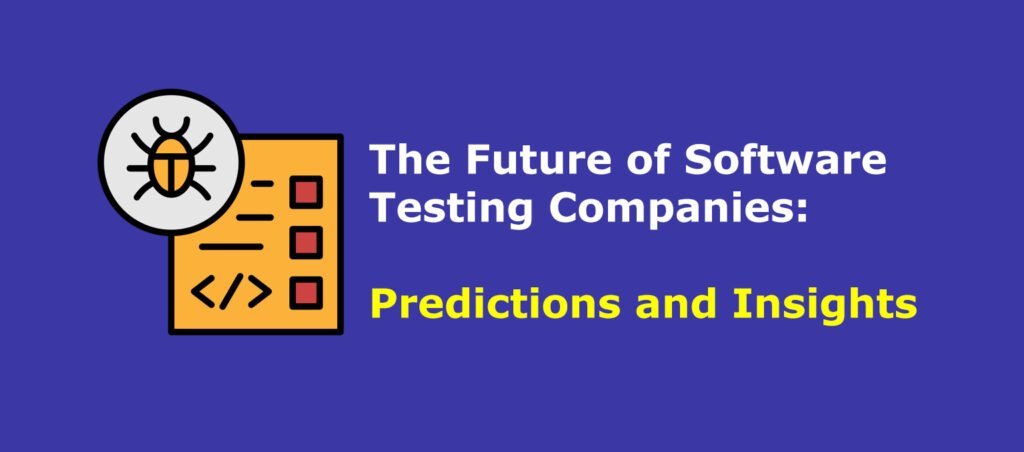In the ever-evolving landscape of technology, software testing has become an indispensable aspect of the software development life cycle. As businesses increasingly rely on software applications to streamline operations and enhance customer experiences, the role of software testing companies becomes more critical than ever.
This blog explores the future of software testing companies, offering predictions and insights into the trends that will shape the industry in the coming years.
I. Evolution of Software Testing:
To understand the future of application testing companies, it’s crucial to reflect on the evolution of software testing itself. From manual testing to automated testing and now incorporating artificial intelligence (AI) and machine learning (ML), the field has witnessed significant advancements. The future promises even more transformative changes, with a focus on speed, efficiency, and ensuring the highest quality software.
II. Rise of AI in Software Testing:
One of the most prominent trends shaping the future of software testing is the integration of AI. AI-driven testing tools can analyze vast amounts of data, identify patterns, and execute complex test scenarios much faster than manual or traditional automated testing. Machine learning algorithms can adapt to changes in the software, improving the accuracy of test results and reducing false positives.
III. Shift-Left Testing:
The industry is experiencing a paradigm shift towards “Shift-Left” testing, emphasizing testing earlier in the software development process. By integrating testing at the beginning of the development cycle, software testing companies aim to identify and address defects and issues at an earlier stage, reducing the overall cost of fixing bugs and improving the time-to-market for software products.
IV. Continuous Testing and DevOps:
The adoption of DevOps practices is on the rise, and application testing companies are aligning their strategies with this cultural shift. Continuous testing, as an integral part of the DevOps pipeline, ensures that testing is not a bottleneck but an ongoing, integrated process throughout the development life cycle. This trend accelerates the delivery of high-quality software, fostering collaboration between development and operations teams.
V. Test Automation and Scriptless Testing:
While test automation has been a key focus for software testing services companies, the future will witness an increased emphasis on scriptless testing. Scriptless testing allows for testing without the need for coding skills, enabling domain experts and non-technical team members to contribute to the testing process. This democratization of testing empowers teams to be more agile and responsive to changing project requirements.
VI. Cloud-Based Testing:
The cloud is transforming the way software is developed, deployed, and tested. Cloud-based testing offers scalability, flexibility, and cost-effectiveness, allowing software testing companies to access a wide range of testing environments and resources on-demand. This trend is expected to gain momentum as businesses increasingly migrate their applications to the cloud.
VII. Security Testing and Ethical Hacking:
With the growing number of cyber threats, security testing is becoming paramount. Software testing companies are incorporating ethical hacking practices to identify vulnerabilities and weaknesses in software applications. As data breaches and cyber-attacks become more sophisticated, the demand for comprehensive security testing services is expected to rise.
VIII. Augmented Reality (AR) and Virtual Reality (VR) Testing:
As AR and VR technologies continue to gain traction in various industries, software testing consulting companies will face the challenge of ensuring the quality and performance of applications in these immersive environments. Testing scenarios for AR and VR applications will require specialized tools and expertise to guarantee a seamless user experience.
IX. Predictive Analytics for Testing:
The use of predictive analytics in software testing will become more prevalent in the future. By analyzing historical testing data, testing software companies can predict potential issues, optimize testing processes, and allocate resources more efficiently. Predictive analytics will contribute to better decision-making, reducing risks and improving overall testing outcomes.
X. Collaboration and Communication:
Effective collaboration and communication between development, testing, and operations teams will continue to be a cornerstone for success. Agile methodologies and cross-functional teams will become even more integral to the software development and testing process. The future of software testing companies relies on breaking down silos and fostering a culture of collaboration for faster and more reliable software delivery.
Conclusion:
The future of software testing companies in India is poised for exciting transformations, driven by technological advancements, changing development methodologies, and the increasing complexity of software applications. From AI-driven testing to the integration of security testing and the rise of scriptless testing, software testing companies must adapt to stay relevant in this dynamic landscape. By embracing these trends, fostering collaboration, and leveraging cutting-edge technologies, software testing companies can play a pivotal role in ensuring the quality, reliability, and security of the software that powers the digital future.
